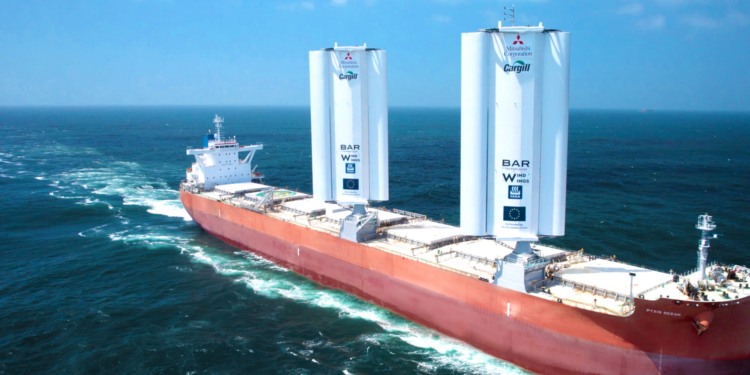Cargill and BAR Technologies’ innovation, BAR Tech WindWings by Yara Marine has set sail on open waters, testing new wind propulsion technology for commercial shipping.
The first vessel to be fitted with two WindWings, large wing sails measuring up to 37,5 meters in height that can be fitted to the deck of cargo ships to harness the power of wind, is the Pyxis Ocean from Mitsubishi Corporation. Produced by industrialization partner Yara Marine Technologies, they are expected to generate average fuel savings of up to 30% on new build vessels, and could be higher if used in combination with alternative fuels. The installation of the wings took place at the COSCO shipyard in China.
“The maritime industry is on a journey to decarbonize—it’s not an easy one, but it is an exciting one. At Cargill we have a responsibility to pioneer decarbonizing solutions across all our supply chains to meet our customer’s needs and the needs of the planet. A technology like WindWings doesn’t come without risk, and as an industry leader – in partnership with visionary shipowner Mitsubishi Corporation – we are not afraid to invest, take those risks and be transparent with our learnings to help our partners in maritime transition to a more sustainable future.”
Jan Dieleman, President of Transportation Business, Cargill.
The installation demonstrates a progressive change in attitudes towards technologies that can enable an energy conversion for existing vessels. Co-funded by the European Union as part of the CHEK Horizon 2020 initiative, the WindWings project can assist the industry in meeting targets by offering a retrofit solution that is capable of decarbonizing existing vessels. This has significance due to the fact that 55% of the world’s bulker fleets are up to nine years in age.
WindWings’ performance will be closely monitored over the coming months to facilitate improvements to the design operation, and performance. The aim is for the Pyxis Ocean to inform the scale-up and adoption across Cargill’s fleet and the industry. Plans are already in place for BAR Technologies and Yara Marine Technologies to build hundreds of wings over the next four years with BAR Technologies continuously researching newbuilds with improved hydrodynamic hull forms.
“If international shipping is to achieve its ambition of reducing CO2 emissions, then innovation must come to the fore. Wind is a near marginal cost-free fuel and the opportunity for reducing emissions, alongside significant efficiency gains in vessel operating costs, is substantial. Today is the culmination of years of pioneering research, where we’ve invested in our unique wind sail technology and sought out a skilled industrialization partner in Yara Marine Technologies, in order to provide vessel owners and operators with an opportunity to realize these efficiencies.”
John Cooper, Chief Executive Officer, BAR Technologies.
The WindWing project is included in a scheme that has received funding from the European Union’s Horizon 2020 research and innovation programme under grant agreement No 955286 – decarbonising shipping by enabling key technology symbiosis on real vessel concept designs. By harnessing the power of wind, WindWings can help vessel owners meet new Carbon Intensity Indicator (CII) rules. As wind power is not only zero emissions but is also non-depleting and predictable, it offers significant efficiency gains in vessel operating costs. WindWings can save, on average, 1.5 tonnes of fuel per WindWing per day with the possibility of saving more on trans ocean routes. This can save vessel owners heavy fuel oil (HFO) at c$800 per tonne.
If you would like to meet with global maritime Suppliers, register for MTB Marine Europe 2023 here.

































